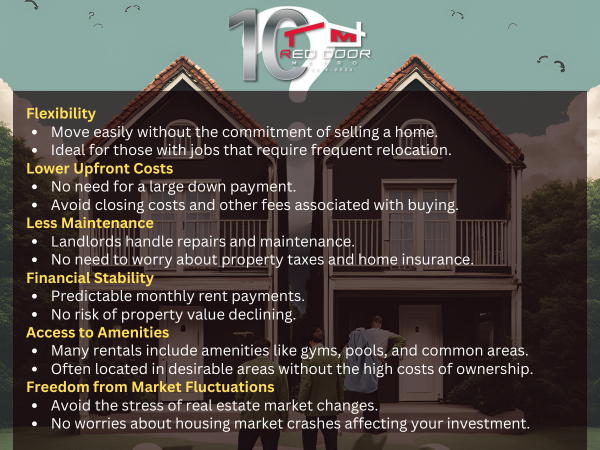
Deciding whether to rent or buy a home is one of the biggest financial decisions many people face. Both options have their own set of advantages and disadvantages. Understanding why some people might choose to rent instead of buy can help clarify this important choice.
Financial Flexibility
One of the main reasons people opt to rent is the financial flexibility it offers. Renting typically requires a lower upfront cost compared to buying. There are no hefty down payments, and tenants don’t have to worry about property taxes. Additionally, renters can avoid the often expensive and unexpected costs of home maintenance and repairs.
Mobility and Flexibility
Renting provides a level of mobility and flexibility that homeownership does not. If you need to relocate for a job, want to experience living in different areas, or prefer short-term commitments, renting is the way to go. It allows for easier relocation without the hassle of selling a property, making it ideal for those whose careers or lifestyles require frequent moves.
Market Uncertainty
The real estate market can be unpredictable. Economic downturns and housing market fluctuations can significantly impact property values. Renting allows individuals to avoid the risks associated with market volatility. By not tying their finances to a property, renters can better weather economic uncertainties.
Lifestyle Preferences
For some, lifestyle preferences play a crucial role in choosing to rent. Urban living, access to amenities, and a minimalist lifestyle can be more easily achieved through renting. Many rental properties offer desirable amenities like gyms, pools, and communal spaces that might be unaffordable or impractical for individual homeowners.
Financial Stability and Planning
Renting can contribute to greater financial stability and better financial planning. Without the burden of a mortgage, property taxes, and maintenance costs, renters can allocate more funds towards savings, investments, or other financial goals. This can be especially beneficial for those looking to avoid debt and build a solid financial foundation.
Maintenance and Repairs
One of the significant advantages of renting is that maintenance and repair responsibilities fall on the landlord. This means that renters can live stress-free, without worrying about the costs or effort involved in fixing things when they break. From a leaking faucet to major structural repairs, it’s the landlord’s problem, not the renter’s.
Credit Score Considerations
For individuals with lower credit scores, renting can be a more viable option. Buying a home often requires a good credit score to secure a mortgage with favorable terms. Renting, on the other hand, is usually more accessible and can also help in building a credit history, which can be beneficial for future financial endeavors.
Down Payment Challenges
Saving for a down payment can be a significant hurdle for many aspiring homeowners. High down payment requirements make buying a home unattainable for some. Renting eliminates this obstacle, making it a practical choice for those who find it difficult to save enough money for a down payment.
Insurance and Liability
Renters insurance is generally cheaper than homeowners insurance. Additionally, the liability considerations differ significantly. Renters are usually only responsible for their personal property and any damage they cause, whereas homeowners have to cover the entire property. This makes renting a less financially burdensome option when it comes to insurance.
Community and Social Life
Renting can offer vibrant community living with plenty of social opportunities. Many rental properties are located in bustling neighborhoods with access to shops, restaurants, and entertainment. This can make it easier to build connections and enjoy an active social life compared to living in more isolated, suburban areas.
Retirement and Aging
As people approach retirement, downsizing becomes an attractive option. Renting provides an easy way to transition to a smaller, more manageable living space without the hassle of selling a home. This flexibility is particularly beneficial for retirees looking to simplify their lives and reduce living expenses.
Environmental Considerations
Eco-friendly rental options are becoming increasingly available. Many rental properties are designed with sustainability in mind, offering features like energy-efficient appliances and green building materials. For those passionate about reducing their carbon footprint, renting can align well with their environmental values.
Legal and Administrative Simplicity
Renting involves fewer legal and administrative responsibilities compared to owning a home. Lease agreements are typically simpler than mortgage contracts, and renters don’t have to deal with the extensive paperwork and legalities associated with buying a property. This simplicity can be a significant advantage for many people.
Conclusion
Renting a home comes with a range of benefits that make it an attractive option for many people. From financial flexibility and ease of relocation to fewer responsibilities and greater lifestyle choices, there are numerous reasons why renting might be the preferred choice. While buying a home has its own set of advantages, renting offers a level of simplicity and freedom that can be hard to beat.
FAQs
What are the main financial benefits of renting?
Renting offers lower upfront costs, no property taxes, and no maintenance expenses, making it a more financially flexible option.
How does renting offer more flexibility than buying?
Renting allows for easier relocation and shorter-term commitments, providing greater mobility for those who need it.
What are the risks associated with buying a home?
Buying a home comes with the risks of housing market fluctuations, economic downturns, and the responsibility of maintenance and repairs.
Can renting be a good option for families?
Yes, renting can be a good option for families, especially those who value financial flexibility, access to amenities, and the ability to relocate easily.
How does renting impact long-term financial planning?
Renting can enhance long-term financial planning by reducing debt, allowing for more savings, and offering opportunities for better investment choices.


